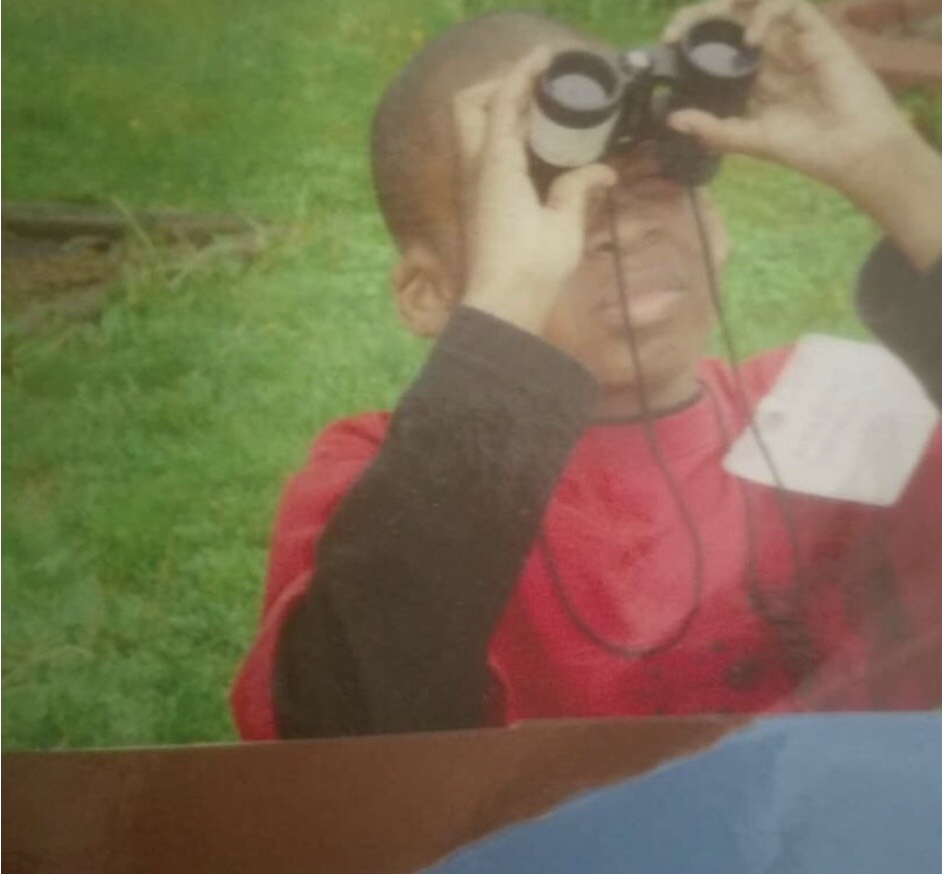“I never felt like I was black enough.” (13:13) Says UMKC student Alex Omorodion. Growing up in his fairly white community, his black classmates often singled him out and made him feel somewhat separated from the community (13:20). Alex grew up with only two other black neighbors in a Nigerian home. His parents migrated to the United States when he was born (15:20). Just knowing that shows how brave his family is for such a huge sacrifice for their family.
On February 16th, 2019, I had the opportunity to interview Alex at Miller Nichols Library on campus early in the morning. To me I didn’t really see a color. I saw him more just as a person. Everyone has their culture and their stories, but in that minute, he went from being a random person to a man with an amazing and unique story.

Alex informed me of his struggles with not feeling “black enough”. For me, being a white female, I don’t experience this stuff. Just because of the way he talks, and how he carries himself, he has always felt like he wasn’t like the other kids of color. “They made me feel separated from my community.” (13:18) His situation I think of like Anja from Art Spiegelman’s graphic novel Maus. The reason for this is because Anja looked very much like a Jewish woman. She always was trying to cover up so people couldn’t see she was Jewish. Except for in this example she is hiding that she is Jewish because it was dangerous for Jews to leave the house at the time of the Holocaust. The reason this reminds me of Alex’s situation is that they are both issues with identity. Since Alex feels like he doesn’t fit in with the black culture, and Anja is trying too hard to fit in with the Germans for safety reasons.
Alex and Anja both became isolated throughout their doubts on not being “good enough.” Or worried about not fitting in. I can also relate in a sense that I don’t trust people to ever let them in. I also do isolate myself from the real world when I can. Sometimes that is easier for people. But instead of being down, Alex changed his isolation into determination for school. Alex is an amazing student and in Honors College. “I don’t want to toot my own horn, but I was always usually the first in math games and everyone would want me for their team. Also, people tried to copy off me for tests.” (08:20)
Coming from a different culture, his family didn’t value sports as much, so he never participated in sports. “In terms of like outside school, I didn’t really do much growing up. I would usually go to school, come home, watch tv, repeat.” (07:53) However, today Alex says he thinks it would have been best if he had done more activities outside of school (07:57) .

Now imagine almost being a freshman in high school and all the sudden your parents tell you to pack up, you’re moving to Nigeria. This is exactly what happened to Alex. He was heartbroken at first, “I thought my friends and I were going to enter high school together and be like the movies.” (17:18) This was upsetting for a few months. But Alex bounced out of it and ended up enjoying it. “I felt almost like a celebrity, everyone knew me, and I didn’t even know them.” He also discussed how he felt more welcome to the African community rather than his “black” community from home (20:15). At first, Alex described his story as a “dreaded trip to Nigeria.” But it made me happy for him how people reacted to his presence there. People treated him like a celebrity of Nigeria, and he had so much family happy to see him. When Americans travel other places or vice versa with other cultures it is always amazing to see someone and learn about their culture.
An interesting culture shock is how intense Nigeria’s education is. An obvious stereotype is how Africa is not very educated and can’t afford education. But maybe they’re underestimated. Alex described college as being the equivalent to high school in Nigeria and said he had 15 classes at a time (18:53). Africa could possibly be coming up in the world if they take their education so seriously. Do you think someday they will “rule” because of how hard they study now? This was very new news to me, since most of what we hear about Africa is poverty and not educated well due to the lack of education. This made me feel happy to know Africa is better than I expected.
Something so small but so new to me was Alex’s story of his first day of school in Nigeria. “My teacher started laughing at me. Then she asked what I was doing with a pencil.” (17:42) It’s the tiniest of things that all around the world people do differently. Alex learned that day that in Nigeria they only use pens and learned the hard way. Alex briefly mentioned that people would joke about his accent (21:55). “I mean they made fun of my accent and like try to imitate me, but it was normal.” To me, this seems like he had some close friends in Nigeria who would play around with him and tease him. I feel like that shows that people are educated and interested in American culture. I feel as if Alex’s trip to Nigeria started completely fresh and he developed many close relationships on his journey abroad.

Going off the culture shocks of Africa, we discussed how his house in Africa was a mansion. It seems crazy that of all places, Africa has mansions. But that also could be because of what he said, “People over there see America as like the holy land. They see America as the land of opportunity.” (20:31) So, having an average income in America it would actually be easier to get a nice place in Africa. I also find it interesting and kind of sad how much they “look up” to Americans. Like they think we are better than them.
One of my favorite questions I created was when I asked, “What do you tell yourself when your struggling?” (08:55) I asked this because I was interested in learning how someone else comes about helping themselves when they need it. He explained how really the biggest factor to help him get through the day is school. He told me how he likes to think of things as if he isn’t the one going through them. Alex explained, “I treat myself like someone I care about.” (09:30)
Another important thing we discussed was how he had never had anyone react the wrong way because of his color. This is interesting because it seems like a lot of people of different colors have wide varieties of issues regarding their race, however, he didn’t. Alex thinks it might be just because he doesn’t go out that much (25:10). I also feel as if Alex is very nice and doesn’t put himself in those kinds of situations.
The only time I feel like I have been in a situation where someone looked at me differently because of my race was when I was in Portugal. I was with friends so we would go out to bars, and a lot of drunk people would be rude to me for my English speaking and even because “Trump is our president”. Like I could help the fact that he is our president. This was a very isolating experience because this is where I was born and made, and these people would say very unnecessary things.
At first Alex described his story as a “dreaded trip to Nigeria.” But one thing that made me happy for him was how people reacted to his presence there. People treated him like a celebrity of Nigeria, and he had so much family happy to see him. He said how he was really upset about moving to Nigeria for his first year of high school, which is understandable because freshman year is what a lot of American kids look forward to.





